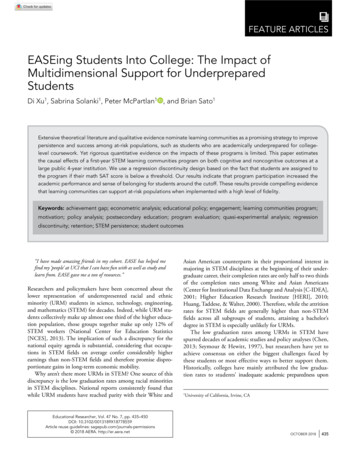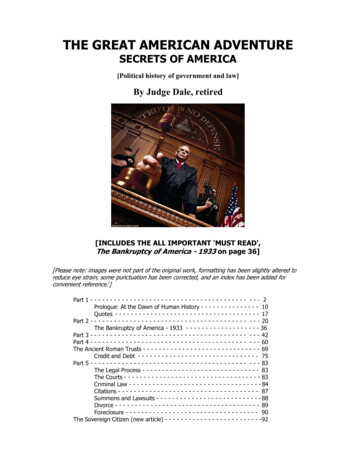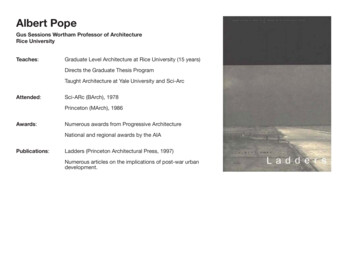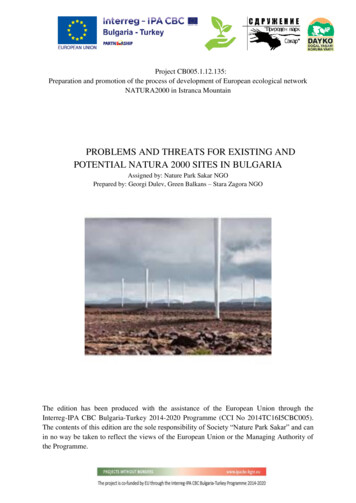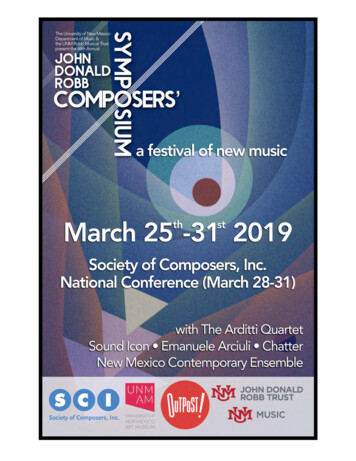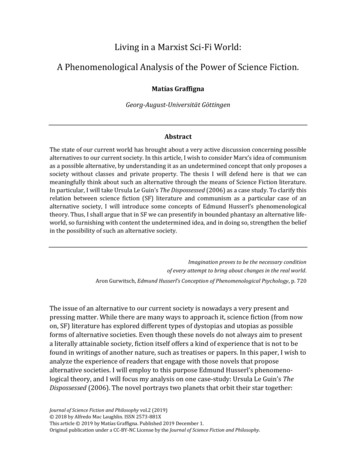
Transcription
Living in a Marxist Sci-Fi World:A Phenomenological Analysis of the Power of Science Fiction.Matías GraffignaGeorg-August-Universität GöttingenAbstractThe state of our current world has brought about a very active discussion concerning possiblealternatives to our current society. In this article, I wish to consider Marx’s idea of communismas a possible alternative, by understanding it as an undetermined concept that only proposes asociety without classes and private property. The thesis I will defend here is that we canmeaningfully think about such an alternative through the means of Science Fiction literature.In particular, I will take Ursula Le Guin’s The Dispossessed (2006) as a case study. To clarify thisrelation between science fiction (SF) literature and communism as a particular case of analternative society, I will introduce some concepts of Edmund Husserl’s phenomenologicaltheory. Thus, I shall argue that in SF we can presentify in bounded phantasy an alternative lifeworld, so furnishing with content the undetermined idea, and in doing so, strengthen the beliefin the possibility of such an alternative society.Imagination proves to be the necessary conditionof every attempt to bring about changes in the real world.Aron Gurwitsch, Edmund Husserl’s Conception of Phenomenological Psychology, p. 720The issue of an alternative to our current society is nowadays a very present andpressing matter. While there are many ways to approach it, science fiction (from nowon, SF) literature has explored different types of dystopias and utopias as possibleforms of alternative societies. Even though these novels do not always aim to presenta literally attainable society, fiction itself offers a kind of experience that is not to befound in writings of another nature, such as treatises or papers. In this paper, I wish toanalyze the experience of readers that engage with those novels that proposealternative societies. I will employ to this purpose Edmund Husserl’s phenomenological theory, and I will focus my analysis on one case-study: Ursula Le Guin’s TheDispossessed (2006). The novel portrays two planets that orbit their star together:Journal of Science Fiction and Philosophy vol.2 (2019) 2018 by Alfredo Mac Laughlin. ISSN 2573-881XThis article 2019 by Matías Graffigna. Published 2019 December 1.Original publication under a CC-BY-NC License by the Journal of Science Fiction and Philosophy.
Graffigna: Living in a Marxist Sci-Fi WorldUrras, a world quite similar to our own, where a capitalist society, with all its knownproblems, coexists with a USSR kind of society. The other, Anarres, is Le Guin’spresentation of an alternative society under the guise of an anarcho-communist socialorganization.Even though Le Guin’s more or less explicit sources of inspiration are to befound in the anarchist movement—especially in the figure of Peter Kropotkin—and intaoism, I understand her alternative society to be a fictional realization of Karl Marx’sidea of communism. I will not engage here in discussions about capitalism, but willrather take Marx’s critique as a starting point: capitalism, as any system based onclasses, exploitation and oppression, must be overcome if we are to live as equal andfree beings. The overcoming of capitalism was postulated by Marx as a next step inhistory, one that we had to fight for to achieve. He named this next stage“communism” and described it as a society without classes and without privateproperty. Nevertheless, Marx did not describe any further how this society would orshould be.I will proceed as follows: in the first section I will introduce Husserl’sphenomenological theory, to make the relevant concepts available to the reader. Inthe second section I shall discuss Marx’s idea of communism, by offering some verybrief and general introduction of it, and by proposing a specific way of understandingit, namely, as an undetermined concept. Finally, in the third section, I will move intothe case-study of The Dispossessed, to show how it presentifies in phantasy1 acommunist life-world. The purpose of this paper is, thus, to argue throughphenomenology that SF literature is a very powerful tool to think about communismas the alternative to our current society. The aim is thus double: first, to offer thephenomenological description of the experience of reading SF in which alternativesocieties are presented and, second, to show that Marx’s undetermined idea ofcommunism is presentified in Le Guin’s work and can therefore be considered a viablealternative to our society.1. An Introduction to some Conceptual Tools of PhenomenologyHusserlian phenomenology is in itself a theory and a method. It claims to be a radicalphilosophy (Husserl 1991, 48), in the sense that is sets out into the path of philosophywithout taking anything for granted, without accepting any presupposition, be it fromthe pre-theoretical life or from the existing sciences and theories. The so-called epochédemands that we suspend the general thesis of the reality of the world (1976, 63), thatis, that we begin our analysis without taking position regarding its existence and thatwe perform a reduction to the sphere of our consciousness and experiences. Theprinciple of all principles (51) demands that we abstain from regarding anything astrue, unless we can bring it to original givenness. What that means is that for eachJournal of Science Fiction and PhilosophyVol. 2: 20192
Graffigna: Living in a Marxist Sci-Fi Worldregion of being there is a corresponding way of givenness that grants us access to thecorresponding objects as they are. The clearest cases are sensory perception for thematerial world and immanent perception (reflection) for acts of consciousness.Meaning, that a material object is originally (truly, really) given to us, when weperceive it; a “mental object” (Erlebnis), like an act or the correlate of an act as such, isoriginally given to us through an act of reflection. Phenomenology is transcendental inthe sense that it holds the world and its objects to be constituted by consciousness. Insummary, everything that is, is the result of a sense-giving activity of the I based onsomething given, where the transcendent world plays the role of the guiding thread.1.1 Perception, Presentification and Phantasy.The first conceptual distinction I wish to introduce, to help us in our analysis, is thatbetween empty and fulfilled intentions or propositions: when I am intentionallydirected to an absent object or state of affairs, that is, one for which I do not have anintuition in the corresponding form, that intention is said to be empty. When theobject or state of affairs is given to me in the appropriate form of intuition, thatintention is thus fulfilled.Not all intentions are to be fulfilled by perception. There is a different class ofacts that can operate as fulfilling-acts: presentifications. So, the second distinction tobe introduced: Perception (Wahrnehmung): is the “mother-form” of acts. In perception an objectis given “in person,” “in the flesh” (leibhaft), originary and present. This does notmean that it is given to me adequately or fully.Presentification (Vergegenwärtigung): is the act in which an object is given, butnot presently, not in person (like in perception). Examples here are: recollection(memory), phantasy, imagination, empathy.2.The form of presentification that will be of relevance for the following analysis isphantasy. In phantasy, we can think about anything in the mode of the “as if,” withoutattending to actuality or, in Husserl’s terminology, in quasi-actuality. We can intendwithout commitment to reality or truth, in what we call the neutrality modification:thinking about something without positing its existence or truth, without judging if itis or isn’t, just quasi-positing. It serves, as Husserl claims, as a form of clarification ormaking something evident:Here [in the quasi-actuality of phantasy] belongs what we normally callclarification, bringing to clarity, it designates always a mode of making[something] evident, of staging a synthetic way [that goes] from an unclearintention to the corresponding prefigurative [vorverbildlichenden] intuition;Journal of Science Fiction and PhilosophyVol. 2: 20193
Graffigna: Living in a Marxist Sci-Fi Worldnamely one that implicitly carries within itself the sense: if it happened as adirect, self-giving [intention], it would fulfill the intention in its being, verifyingit. The prefigurative intuition of this verifying fulfillment does not produceactualizing evidence of being, but it does [produce evidence] of the possibilityof being of the corresponding content. (Husserl 1991, 94)3As an example, think of how a complex experiment is designed: a series ofinitial conditions must be given, a procedure described, arriving to propositions of theform "if, under the circumstances, this and that were to obtain, then we would knowthat." and so on. In phantasy we build up these prefigurative intuitions that, based onthings we already know, enable us to think about things we do not yet know. We cancontemplate possibilities, necessities and impossibilities in pure phantasy, and moveto perception to find out what actually is the case. While phantasy alone cannot elicitknowledge about the actual world, it is the source of knowledge for possibilities of theactual world.Phantasy can be “free” or “unrestricted,” or it can also be bound phantasy. Eventhough free phantasy will always be restricted by our mental capacities, it extendswell beyond the limits of the world as we know it. I can, for instance, phantasize abouta planet or universe, where gravity does not apply. I picture in my mind pigs floating,while leaves fall and stones swirl in between. If I were to do that with theoreticalpurposes, I would soon arrive at the conclusion that “it cannot possibly be the case.”But one could write a nice story about such a place; nothing prevents us fromentertaining these thoughts or images in our phantasy4. A bound phantasy, on theother hand, is one that sets out to think, imagine or contemplate states of affairs thatare possible according to the laws of a given domain. The previous examplecontravenes our knowledge of physics, but the notions of a space elevator or a Dysonsphere, although today technologically impossible, seem to be products of phantasythat respects the laws of physics (at least, we have not yet found concluding reasonsto deem them impossible)5. Regarding this distinction, Husserl claims:If I have a pure phantasy, then I can make a supposition [Ansatz]. I think tomyself, that would be real. I can then think hypothetically, keep thinking,extract necessary consequences, etc. But still, I would not have any relation toreality. I do not simply dream, but I think that the dreamed world would be areality, and it pertains to it, that I hold fast to the dreamed, that I come back tothe same thing and that I hold it fast in its identical sense. (2009, 211)This supposition one makes is precisely that our phantasy “could be real.” Themovement from free phantasy to bound phantasy consists in binding the originalphantasy to known elements of a specific part of the world, in order to determinetheir possibility. This, as we said, does not guarantee any actual relation to reality,Journal of Science Fiction and PhilosophyVol. 2: 20194
Graffigna: Living in a Marxist Sci-Fi Worldsince for that we need more than phantasy (we need the corresponding acts that giveus the objects of the region in question); but it does bind us to the real, in the sense ofcontinuing the phantasy according to the laws and principles of the region in question,and thus it offers the opportunity of considering the possibilities and necessitiescontained in it. In this sense, Moylan’s description of one of the features of the socalled genre of critical Utopia (a genre under which The Dispossessed falls), recognizesthis property of boundedness:Opposed to other fantastic forms, utopias and science fiction practice anestrangement that is cognitively consistent with nature as it is known or withthe imagined natural laws in the particular text. That is, the estranged world ofutopia must appear realistic, must not partake of the impossibilities of thesupernatural or the naturally undoable. This textual game depends on theauthor’s rhetorical ability to create a mode of discourse which allows her orhim to exaggerate, intensify, and extend scientific, technological, and socialconditions to their most extreme point while convincing the reader thateverything which occurs in the fantasy world is feasible. (Moylan 2014, 33)1.2 The Life-WorldThe last concept I wish to introduce for our analysis is that of the life-world. Everyexperience we have is always surrounded by a horizon of undetermineddeterminability (Husserl 1976, 57), meaning: while I am directing my attention to aspecific object in my surroundings, other objects are there for me not being presentlythematized, but susceptible of receiving my full attention if I turn it to them. In thisway, the undetermined objects in my experience can always be further determinedthrough further experiences. The world is said to be the horizon of all horizons, theall-encompassing horizon. Somewhere “between” the immediate horizon of a concreteexperience and the ultimate horizon of the world, we find the life-world as our homeworld (Heimwelt)6. On the other hand, the life-world is our ground, foundation for allexperiences:The life-world is [ ] for us, the ones who live in it awake, always for us there,being for us in advance, “ground” for all praxis, be it theoretic or non-theoretic.(1976b, 145)We learn and acquire our constitutions and senses from our life-world, from ourpractical relation to what is out there for us. In this sense, it serves not only asencompassing horizon, but also as foundation for our habits, understanding andbeliefs. It is also “a kingdom of originary evidence” (130), upon which the evidences ofour perceptions, memories, presentifications, verifications, inductions are grounded.Journal of Science Fiction and PhilosophyVol. 2: 20195
Graffigna: Living in a Marxist Sci-Fi WorldEven though the life-world “has in all its relativities a general structure,” one “uponwhich all that is relative is bound,” but “it’s not itself relative” (142), there aredifferent life-worlds, for example, for different cultures:But when we end up in a foreign surrounding, with the Negroes in Congo or theChinese peasants, etc., then we hit upon the fact, that their truths, the facts thatstand for them certain and verified or to be verified, are by no means our own.(141)The life-world, then, as ground of our experience, is the complex whole ofsenses, meanings, beliefs, habits, relations, possibilities and goals we acquire, thatserve as a basis for our life. From another perspective, these elements do not onlyintroduce us into the world, but also remain there through our entire lives as a frame,as a horizon for all of our experiences. The life-world as such has its own ontologicalstructure, independent of any concrete case. As part of that invariant structure,individuality appears: it is an essential trait of the life-world to manifest itself inconcrete forms, according to different factors, resulting so in different life-worlds.Thus, we can speak of the life-world as being one and the same for all humans, whileat the same time acknowledging that each culture, at each time in human history, haslived in a different life-world 7.What we want to analyze in this context is precisely the relation betweenphantasy and life-worlds. On the one hand, all that we phantasize is bound by ourexperience, that has its roots in the ground of the real, actual life-world 8. Even in mywildest phantasies I see colors and shapes, objects and events, there are language andconcepts, etc. All that I can phantasize is, to some extent, an object of possibleexperience: because I am experiencing it through phantasy. Now, if I bind myphantasy through specific known empirical laws, I can try to phantasize aboutactualizable possibilities, that may in due course prove themselves as more thanpossibility, or as impossible.When the product of our phantasy is a whole fictional world, a whole society,the question about its possibility is harder. But to answer this question is notimpossible. There are also laws that bind us: historical, sociological, biological,economical, anthropological, etc. Even if each has a different status as a law, one canstrive to be bound by them in phantasy and try to build a coherent world (like somany SF authors do so well). A successful phantasy about a world based on certaintheoretical ideas (i.e. Marx’s communism) can strengthen the belief in the possibilityof these ideas and also increase their desirability.Journal of Science Fiction and PhilosophyVol. 2: 20196
Graffigna: Living in a Marxist Sci-Fi World2. The Marxist Idea of CommunismMarx dedicated most of his writing to an economic-political critique of human history,focusing especially on its present stage of capitalism. Through his dialectics, heshowed how “the history of all societies until now is the history of class-struggle”(Marx and Engels 1977, 462), a struggle that developed from the opposition betweenslaves and masters, through that of lords and peasants, all the way to the present-daybourgeois and proletarians.As it is well known, Marx’s critique of capitalism does not end with thedescription of the current system, but moves on into a proposal/predictive phase: therevolution would take history to its next stage, a social organization which would nolonger be based on relations of exploitation and oppression, which he called“communism.” Even though both he and Engels elaborated with some detail how thisrevolution would occur and what the so called “dictatorship of the proletariat” shouldaim to do once in power to reach communism, the concrete content of communismitself was left rather unattended. It is indeed quite hard to find explicit statementsabout the future communist society in the 43 volumes of the Marx and Engelscomplete works. In The Communist Manifesto, the authors claim: “In this sense, thecommunists can summarize their theory with one expression: abolition of privateproperty” (475). It is important to point out that the sense of “private property” meanthere concerns primarily, if not exclusively, the property of the means of productionand not, say, your toothbrush or shoes. What defines the communist society as such, isthe fact that no one owns the means of production and the resources themselves.What happens to other forms of property remains an open issue to be discussed in amore advanced phase of communism-planning 9.Engels answers the question, “Of what kind must this new social order be?”thus:Above all, it will take the work of the industry and all branches of production ingeneral from the hands of the particular individuals, who create competition,and for that purpose it will let all these branches of production be operated bythe whole of society, that is, for common calculation, according to common planand under participation of all members of society. It will, therefore, abolish thecompetition and place the association in its stead. [ ] Precisely the privateproperty will have to be eliminated, and in its place will enter the common useof all instruments of production and the distribution of all products accordingto common agreement, or the so called community of goods. (Engels 1977, 370;my emphasis.)Journal of Science Fiction and PhilosophyVol. 2: 20197
Graffigna: Living in a Marxist Sci-Fi WorldAs we can see then, the abolition of private property would entail that ofclasses and exploitation, turning production, the whole of economy, into a decision ofthe whole of society, that shall proceed in such a way that shall bring about theprinciple of: “each according to her capacities, for each according to her necessities!”(Marx 1987, 21). In a more philosophical than economical note, Marx claims:Communism [is understood] as the positive transcendence [Aufhebung] ofprivate property as human self-alienation and for that reason as real acquisitionof the human essence through and for the humans; because of that, as acomplete return of the human being for themselves as a social, that is, ahumane human being—a return that came to be consciously and within thetotal richness of the present development. This communism is as anaccomplished naturalism humanism, as an accomplished humanism naturalism; it is the true dissolution of the conflict between the human beingwith Nature and with the human being; the true dissolution of the fightbetween existence and essence, between objectification and self-confirmation,between freedom and necessity, between individual and species. It is thedissolved riddle of History and knows itself as this solution. (Marx 1968b, 536)From the sharp critique of the capitalist society follows a clear conclusion: it isfrom the relations of exploitation based on private property that basically most, if notall, of the social evils and injustices plaguing our society stem. Therefore, it is onlylogical that drastically changing these foundations would bring about an entirely newsociety, where these contradictions are finally resolved, or dissolved. This, of course,does not mean that new contradictions (or “problems”) will not arise. We do not knowthat, but at least these—i.e., the ones we know today in our current society—would betranscended.Communism was, then, proposed to be a society with no classes and no privateproperty. As to what that means, how we can further determine this notion, we canextract the following tenets from the previous quotations, that will serve in ouranalysis of Le Guin’s book: Administration of resources, industry, production by the whole of society, withactive participation of its members (instead of particular individuals).Association or cooperation instead of competition.Community of goods: common use of all instruments and products, according tocommon agreement.Capacities and necessities as criteria for distribution of goods and division oflabor.Journal of Science Fiction and PhilosophyVol. 2: 20198
Graffigna: Living in a Marxist Sci-Fi World Transcendence of self-alienation and existential contradictions of the humanbeings amongst themselves and towards nature.There is also a very good reason why Marx was not more explicit about how acommunist society would be like: we do not know, and we cannot possible know apriori. Our society is the product of history and of the material conditions ofproduction; the future society shall be the product of future material conditions andthe history that leads to it. Until they are realized, any claim about that society will beno more than speculation—an exercise which Marx, in his scientific attitude, alwaysabstained from.Marx and his followers had their reasons not to speculate or describe how acommunist society would be in its concrete determination. That does not mean, thatwe cannot consider possible realizations of that very undetermined and empty idea ofa society without classes, state, exploitation, oppression, private property, andexistential contradictions. I believe that Anarres, Le Guin’s anarcho-communistsociety, is one such realization of these undetermined concepts.3. Science Fiction and Communism through Phenomenology: The DispossessedI do not wish to claim that Le Guin specifically set herself to illustrate Marx’scommunism. Her known influences in this matter are rather Kropotkin (1902) andtaoism10. The history of the relation between the movements of anarchism andcommunism is a matter of its own, and I do not wish to engage with it here. Suffice itto say, there undoubtedly is a compatible version of them: anarcho-communism.While Le Guin might have taken her inspiration from multiple sources, I find that hernovel portraits enough elements of communism à la Marx, and these I intend to showin the following.I will continue by advancing my general thesis: I believe The Dispossessed—asthe chosen example amongst others—has the power to let its readers presentify inphantasy Marx’s idea of a communist society, especially in that it creates a life-worldwhere these ideas are realized: the truths upon which the Anarresti stand are by nomeans our own. If Marx’s idea of communism is, as I claimed, an undetermined one,then Le Guin’s work is one possible determination of it. This is not to say that thisAnarresti society is the one and only determination, but through it, I claim, we gaininsight as to the possibility of communism in general.Not only that, but in fiction we gain more than conceptual content. One couldtheorize and offer different “models” of societies that would satisfy the idea ofcommunism, and even furnish them with very specific degrees of content. Thedifference is, precisely, that the contents we gain in fiction are not only of anJournal of Science Fiction and PhilosophyVol. 2: 20199
Graffigna: Living in a Marxist Sci-Fi World“intellectual” nature, but are lively contents. We get to stand in the shoes of anindividual who lives in such a society and, even more, that looks at one like our ownwith his own eyes. This gives us the possibility, even if only in phantasy, of dwelling insuch a world. A helpful comparison for a very similar idea could be the differencebetween a history textbook and a historical novel. While the former is usually moreaccurate and intellectually informative, the latter has the power of putting us in thetime and place, and gives us a glimpse into life as it was then.The whole capitalist society, especially considering globalization, can beconsidered as a unitary life-world, in that enough common elements are present11. Forthis reason, I find the creation of this anarcho-communist life-world so powerful: itpresents a completely different “ground” upon which our basic intuitions,constitutions, common sense, praxis and the source of our evidence stand. That whichis “obvious,” undoubted and self-evident on Anarres are totally different principlesthat our own, the horizons under which we live are completely different from theAnarresti.Let us dive into the case-analysis by reconstructing the setting: Urras, themother planet, offered their revolutionary “Odonians” (named after Odo, the womanwho lead them) the barren moon, Anarres, to inhabit, in exchange for never returningand cutting all sorts of communications, except for some basic exchange of goods. Thenovel begins some two hundred years after this, when the Odonian society is alreadyrunning under the principles of anarcho-communism. Our main character, Shevek, aphysicist who amongst others on Anarres begins to question some of the “new”problems that appear, embarks himself in a journey to the mother planet, where hefaces for the first time, in person, capitalism and the state. Shevek’s knowledge ofUrras and, therefore, of capitalism and state-societies, has been up to that point emptyknowledge. It is through his experience in Urras that he fulfills those intentions andgains intuitive knowledge of what is like to live in such a society. Shevek gets toexperience a capitalist society like our own as an anarcho-communist, while we,capitalist citizens, catch a glimpse of anarcho-communism on Shevek’s Anarres.The following passage is taken from a scene in which Shevek, during his stay inUrras, is dinning at the house of a colleague, Oiie, with his wife and children. Shevek isconfronted by some of the usual questions a capitalist citizen might have, and Shevekaddresses them all with the spontaneity of someone who comes from another world. Iwill quote in extenso, but offer my comments in between:“But what,” Oiie said abruptly, as if the question, long kept back, burst from himunder pressure, “what keeps people in order? Why don’t they rob and murdereach other?”Journal of Science Fiction and PhilosophyVol. 2: 201910
Graffigna: Living in a Marxist Sci-Fi World“Nobody owns anything to rob. If you want things you take them from thedepository. As for violence, well, I don’t know, Oiie; would you murder me,ordinarily? And if you felt like it, would a law against it stop you? Coercion isthe least efficient means of obtaining order.” (Le Guin 2006, 126)Here we find quite a clear affirmation of the anarcho-communist character ofAnarres: no property and no laws. “Nobody owns anything” seems quite a clearexample of the “community of goods” we found in the previous quotation from Engels.On Anarres, goods are readily available to all its citizens. While people might holdpossession of things such as clothing items, tools or even jewelry (273), everythingone might need lays at the their disposal, rendering the idea of theft itself nonsensical.While the absence of laws is an explicitly anarchist element and not technically aMarxist one, the way in which Shevek considers the question itself is quite in line withMarx’s notion of contradictions being solved, the “fight between necessity andfreedom” disappearing altogether. Anarchism and communism go hand in hand onAnarres: in a socialized economy, there is no place for coercion.Oiie hits again:“All right, but how do you get people to do the dirty work?”“What dirty work?” asked Oiie’s wife, not following.“Garbage collecting, grave digging,” Oiie said; Shevek added, “Mercury mining,”and nearly said, “Shit processing,” but recollected the Ioti taboo on scatologicalwords. He had reflected, quite early in his stay on Urras, that the Urrasti livedamong mountains of excrement, but never mentioned shit. (126)Before getting to the most-important Anarresti socio-economical organization,the scatological taboo deserves some mention. It would be far-fetched to claim thatsuch a taboo only exists within an oppressive society (like capitalism) and that itwould automatically disappear in anarcho-communism. Yet, so was the case forAnar
Graffigna: Living in a Marxist Sci-Fi World Journal of Science Fiction and Philosophy Vol. 2: 2019 2 Urras, a world quite similar to our own, where a capitalist society, with all its known problems, coexists with
